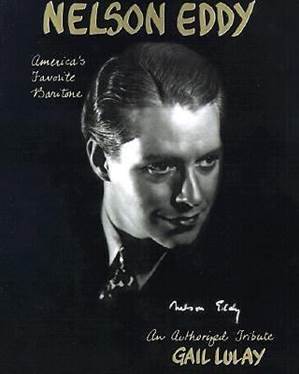
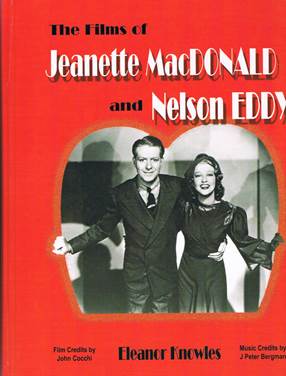 Click here to see an inerview with the author
Click here to see an inerview with the authorNELSON EDDY (photos courtesy Charles Mintzer collection)

 Click here to see an inerview with the author
Click here to see an inerview with the author
Click here to order the Nelson Eddy book
Click here to order the The Films of book
Click here for a website on the two singers
I admit it from the start; I’ve never admired Mr. Eddy’s voice. Yes, it’s true it has a certain warmth, a good and homogeneous sound from top to bottom and you can recognize it. Therefore what is lacking in my opinion ? First and foremost I find the sound to be somewhat artificial, somewhat doctored; not a natural voice built from raw talent but constructed from honest though not over rich material. Second, the voice lacks personality, it is a little bland. Though always musical, it is not an inspiring voice. It comes and goes like a smooth river but I cannot remember sitting up hearing a particular phrase, a flash of insight, a particular forte or diminuendo that suddenly sheds some new light on a role or a song. Eddy is never less than capable but never more than that. In a way he is typical for the Anglo-Saxon baritone who lacks the brilliant colours, the unique sound or even roughness often met in the Italian breed. Eddy is a worthy companion of opera singers like John Charles Thomas, Robert Weede, Sherill Milnes or William Stone: singers you would be happy to hear in the house but who don’t radiate excitement on record (fans of Milnes will definitely agree). I even dare to say what is lacking in their vocal equipment: a certain ethnic sound due to their heritage, physique and lack of English as a language with their forefathers. I do not think to it’s a coincidence that Robert Merrill or Leonard Warren were Jewish.
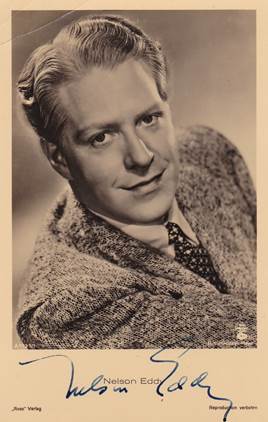
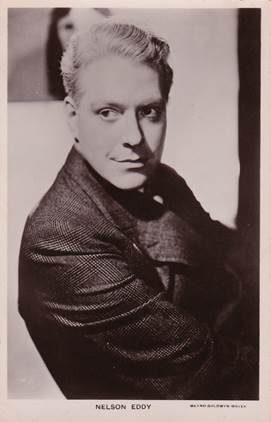 Click here to an appearance of Eddy in "What's my line?"
Click here to an appearance of Eddy in "What's my line?"
Due to his movie career, Eddy had a tremendous following which always –as a non-American- surprised me. He was not the “beau garcon” that Robert Taylor, Gregory Peck or Tyrone Power were. He did not have the rakish charm of Clark Gable, the ruggedness of Gary Cooper or the ideal son-in-law profile of Jimmy Stewart (who scored his first real movie success in the MacDonald-Eddy-vehicle Rose Marie). But it is true, he sang better and he had an operatic and recital career before coming to the movies; a feat his successors Gordon MacRae and Howard Keel never attempted or probably aspired to. Maybe their voices didn’t carry without a mike.. Still, I’ve got a feeling that none was more surprised by his immense popularity in the thirties than Nelson Eddy himself. Maybe he was the right man on the right place in the right time: good voice, good looks, acceptable acting and not overly talented in one single aspect: in short a country boy America liked. Nevertheless for someone like this rather critical reviewer Mr. Eddy reminds me that once there existed another US where millions of people liked real voices and not 100 % miked ones, where melody and harmony were important, where traditional lyric European outpourings was deliciously mixed with something younger and vital, where environmental rock pollution and stupid beats were yet in their infancy and not called “music” or where idiots and morons stumping their dead brains as senseless children of two years were not called “music lovers”. Mr. Eddy like many a Hollywood star (MacDonald and Durbin in the forefront; not Lanza who had one of the four or five greatest operatic voices of the last seventy years) inspired some people to reach for higher steps on the ladder. The baritone himself often sang art songs in his many concerts after the war as he wanted to stress the fact that he was a serious singer in the first place. The movie songs came out during encore time. Most movie goers were satisfied with “Rose Marie I Love You” or “Sweethearts Sweethearts, Sweethearts” or “I’m falling in love with someone, someone gay (in the original meaning)”. But I remember some serious scientific research that proved listening “hinauf” as the Germans say is possible for 2 or 3 % of an audience; in Eddy’s case slowly switching from operetta and ballads to opera without a condescending attitude towards one’s first love.. Such a figure would mean that almost half a million of Americans were inspired by the fabulous duo: a figure which makes one sigh but which is proven by the importance given to classical music in articles in American newspapers, magazines, radio before the war and even television in the fifties and sixties. Alas, a civilisation gone with the wind.
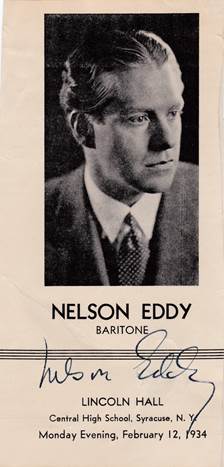
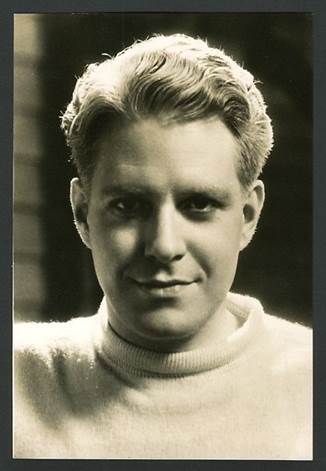 Listen to Eddy and Douglas Stanley in a vocal technique lesson
Listen to Eddy and Douglas Stanley in a vocal technique lesson
Even nowadays Eddy has his fans, though most are probably rather grey. During the nineties book publishers still were not shy to publish several biographies of the two singers. There even was a book on Mr. Eddy’s operatic career. Even then Sharon Rich – the best known writer on the famous duo- scored her biggest success with a book on the intimate relationship between MacDonald and Eddy. Did they or didn’t they. They did, according to Rich. A book like “Nelson Eddy, America’s Favourite Baritone (an authorized tribute)” by Gail Lulay prefers the traditional chaste story and therefore had to appear with a self publishing company; proven at first sight by the many flawed photographs. Still the book has its merits as it draws heavily on the memories of Gale Sherwood who was a singing companion of the baritone for many years after his movie years were over. By 2006 the ranks of MacDonald and Eddy fans had further thinned out. Therefore the big almost coffee table book (636 pages) on “The films of Jeanette MacDonald and Nelson Eddy” by Eleanor Knowles is too the result of self publishing and shows a lot of washed out photographs as well. A pity as the book by this movie historian is well researched and a treasure trove for anybody interested in the singers or even the history of movie making in Hollywood. Each film is discussed in great an interesting details. Where did the music came from (sometimes bar by bar information) ? How much did Hollywood rescue from famous staged operettas (often very little) ? There is an almost scene by scene discussion, a script history, a section on movie goofs which seem
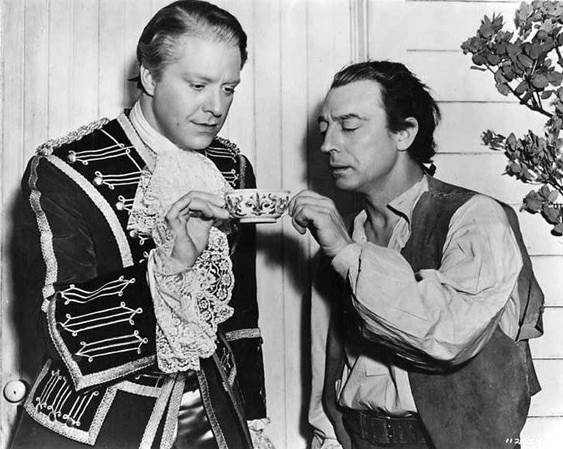
inseparable from film making (or TV-productions as I’m well aware of as a former TV-producer/journalist). Then there are the reviews and the reaction of the public. Strangely enough, what is lacking is the money each movie grossed though these figures are well known and prove what a success these films were. In the background there is a wealth of stories told on Hollywood lore and the influence of moguls like Louis B. Mayer and his directors. In short, you don’t have to be a member of a MacDonald or Eddy fan club to read this fascinating account of movie and music making during Hollywood’s Golden Age. Moreover there is a formidable addendum in the discography of both singers as a duo and as a soloist (per title, not per recording date as opera lovers prefer) and a good index. I wish someone would do the same with this richness of detail for other fine movie singers like Lawrence Tibbett, Nino Martini, James Melton, Allan Jones and yes even Mario Lanza.
Jan Neckers